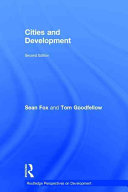

Most ebook files are in PDF format, so you can easily read them using various software such as Foxit Reader or directly on the Google Chrome browser.
Some ebook files are released by publishers in other formats such as .awz, .mobi, .epub, .fb2, etc. You may need to install specific software to read these formats on mobile/PC, such as Calibre.
Please read the tutorial at this link: https://ebookbell.com/faq
We offer FREE conversion to the popular formats you request; however, this may take some time. Therefore, right after payment, please email us, and we will try to provide the service as quickly as possible.
For some exceptional file formats or broken links (if any), please refrain from opening any disputes. Instead, email us first, and we will try to assist within a maximum of 6 hours.
EbookBell Team

4.0
6 reviewsFor the first time in human history more people now live and towns and cities than in rural areas. In the wealthier countries of the world, the transition from predominantly rural to urban habitation is more or less complete. But in many parts of Africa, Asia and Latin America, urban populations are expanding rapidly. Current UN projections indicate that virtually all population growth in the world over the next 30 years will be absorbed by towns and cities in developing countries. These simple demographic facts have profound implications for those concerned with understanding and addressing the pressing global development challenges of reducing poverty, promoting economic growth, improving human security and confronting environmental change.
This revised and expanded second edition of Cities and Development explores the dynamic relationship between urbanism and development from a global perspective. The book surveys a wide range of topics, including: the historical origins of world urbanization; the role cities play in the process of economic development; the nature of urban poverty and the challenge of promoting sustainable livelihoods; the complexities of managing urban land, housing, infrastructure and urban services; and the spectres of endemic crime, conflict and violence in urban areas. This updated volume also contains two entirely new chapters: one that examines the links between urbanisation and environmental change, and a second that focuses on urban governance and politics.
Adopting a multidisciplinary perspective, the book critically engages with debates in urban studies, geography and international development studies. Each chapter includes supplements in the form of case studies, chapter summaries, questions for discussion and suggested further readings. The book is targeted at upper-level undergraduate and graduate students interested in geography, urban studies and international development studies, as well as policy makers, urban planners and development practitioners.